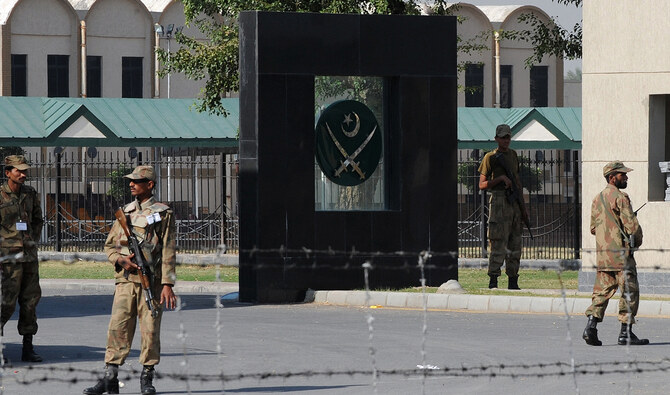ISLAMABAD: The Pakistan Army announced on Thursday it has taken three more retired officers into custody in connection with the Field General Court Martial (FGCM) of former spymaster Lt. Gen. (retired) Faiz Hameed, who was arrested this week on charges of multiple violations of the Pakistan Army Act.
Hameed, who served as the director general of Inter-Services Intelligence (ISI) from June 2019 until October 2021, is widely seen as having been close to former prime minister Imran Khan, who has been in jail since August 5, 2023, on a slew of charges.
Khan’s Pakistan Tehreek-e-Insaf (PTI) party has frequently claimed harassment and intimidation by state agencies since the downfall of its administration in a no-confidence vote in April 2022, though the state institutions deny the allegations.
The army initially said it had acted against Hameed in compliance with the orders of the Supreme Court on a petition filed by the management of the Top City housing society, accusing him of extortion, land grabbing and snatching valuables, though its latest statement indicates he is being investigation for political activities.
“In connection with the FGCM proceedings of Lt Gen (Retd) Faiz Hameed, three retired officers are also in military custody for their actions prejudicial to military discipline,” the army’s media wing, Inter-Services Public Relations (ISPR), announced in a statement.
“Further investigations of certain retired officers and their accomplices for fomenting instability at the behest of and in collusion with vested political interests are continuing,” it added.

This undated file photo, released by Pakistan’s Inter-Service Public Relations (ISPR), shows the former chief of the Inter-Services Intelligence (ISI) spy agency, Lt. Gen. (retired) Faiz Hameed. (Photo courtesy: ISPR/File)
MORE ARRESTS, IRREFUTABLE EVIDENCE
Meanwhile, Information Minister Ataullah Tarar welcomed the development in a news conference, saying that every institution should practice self-accountability.
He pointed out that the ISPR’s press release spoke of vested political interests, saying that it was referring to Khan’s “collusion” with the former DG ISI to destabilize the country.
“With General Faiz’s arrest and after his interrogation the arrest of these officers, it seems that more arrests will take place,” Tarar said, warning that not only army personnel but any person found guilty of destabilizing the country will be held accountable.
He said the army was carrying out the accountability process based on “irrefutable evidence.”
Speaking to reporters, PTI leader Omar Ayub demanded action against other officers of the army who were involved in other illegal activities.
“Those officials who were involved in illegally raiding homes of PTI leaders should also be held accountable for their actions,” Ayub said.
Khan, who ruled the country as its prime minister from 2018-2022, was widely believed to have been propelled to power with the backing of the military.
However, he blamed the army for not preventing the no-confidence motion against him in 2022, which he said was part of a broader international conspiracy against his government, hatched in Washington and implemented by his political rivals in Pakistan. However, US officials and others targeted by his allegations have frequently denied the charge.
It is widely believed that Hameed was advising Khan when the PTI was publicly criticizing the army and its top leadership, though local media reports claim the former prime minister has since distanced his party from Hameed, calling his arrest “the army’s internal matter.”
















